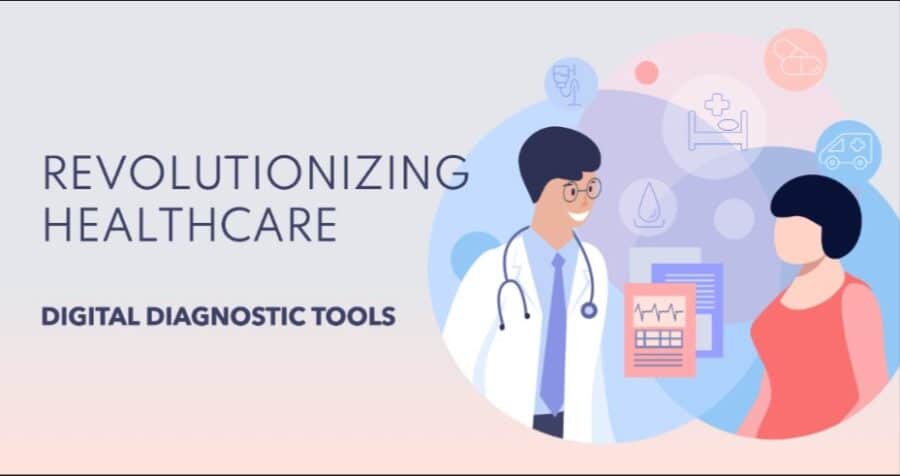The landscape of healthcare is undergoing a transformation, driven by the integration of digital technologies into diagnostic processes. Digital diagnostic tools are reshaping how medical professionals diagnose and manage diseases, enhancing the accuracy of assessments and improving patient outcomes. These advancements are not just changing medical practices but are also making healthcare more accessible and efficient.
The push towards digital diagnostics is part of a broader movement towards personalized medicine, where treatments and interventions are tailored to individual patients based on their specific health data. This personalized approach is only possible through the collection and analysis of vast amounts of health-related information, facilitated by digital tools. In this article, we explore how these innovations are making a significant impact on the healthcare industry and what it means for both providers and patients.
Convert MS Word to PDF in seconds. Keep your formatting intact and easily share or print your documents with this simple tool.
Enhance Diagnostic Accuracy:
Digital diagnostic tools leverage advanced algorithms and machine learning to analyze medical data, which can help in identifying diseases with greater accuracy and speed. These tools have the capability to detect nuances in data that might be missed by the human eye, such as slight variations in cell structures or minute changes in organ function over time. For example, AI-enhanced imaging tools can more accurately identify and stage cancers, potentially leading to earlier and more effective interventions.
Furthermore, these technologies reduce human error and increase diagnostic consistency. Consistency in diagnosing conditions, especially those with complex symptoms, can be challenging across different healthcare providers. Digital tools standardize the interpretation of medical images and patient data, leading to uniformity in diagnostic processes and reducing variability in clinical outcomes.
- Thanks to Jessica Shee from iBoysoft
Streamline Clinical Workflows:
Digital diagnostic tools streamline clinical workflows by automating routine tasks, thereby freeing up healthcare professionals to focus on more complex and patient-centric activities. Automation in diagnostic processes not only speeds up the workflow but also reduces the fatigue associated with repetitive tasks. For instance, automated data entry systems can directly upload patient data into their health records, eliminating manual entry and minimizing errors.
Incorporating these tools into healthcare systems also facilitates better coordination of care. Digital platforms can integrate diagnostic results quickly and efficiently with patient records accessible by multiple healthcare providers. This integration ensures that all members of a healthcare team have up-to-date information, which is crucial for timely and effective patient management.
- Thanks to James Thomas, Community Content Manager, Rehab Near Me
Expand Access to Healthcare:
Digital diagnostic tools are pivotal in expanding access to healthcare, particularly in underserved or remote areas. Mobile health applications and portable diagnostic devices can bring medical services to populations that previously had limited or no access to healthcare. For example, smartphone-connected diagnostic devices allow for the conducting of sophisticated tests like ultrasounds or ECGs in a patient's home, with results that can be remotely analyzed by specialists.
Moreover, telemedicine platforms utilize digital diagnostic tools to provide virtual consultations, where doctors can assess, diagnose, and prescribe treatment to patients without the need for physical travel. This not only saves time but also reduces the barriers to accessing specialist care, particularly for chronic disease management.
- Thanks to Oliver Capon, Operations Manager at Smart Detectors
Personalize Patient Care:
The use of digital diagnostic tools facilitates a personalized approach to healthcare, where treatments are specifically tailored to the individual characteristics of each patient. These tools analyze large datasets from various sources, including genetic information, to predict disease risk and response to treatment. Personalized diagnostics help in identifying the optimal treatment regimens, which can improve patient outcomes and reduce the likelihood of adverse reactions.
Personalized medicine, supported by digital diagnostics, also empowers patients to take an active role in their health management. Digital tools provide patients with access to their own health data, encouraging engagement and self-management of chronic conditions, which is essential for long-term disease management.
- Thanks to Promise Okeke, CEO of NovoPath
Foster Innovative Medical Research:
Digital diagnostic tools also play a crucial role in advancing medical research. They enable the collection and analysis of vast amounts of health data, which can be used to develop new treatments and understand disease patterns. Big data analytics applied to these datasets can uncover insights that would be impossible to detect through traditional research methods.
These tools also facilitate clinical trials by identifying suitable candidates and monitoring their responses to new treatments in real time. This not only accelerates the pace of medical research but also enhances its accuracy and efficiency, paving the way for breakthroughs in medicine that can be translated into clinical practice more swiftly.
- Thanks to Jorge Sanchez from Physician on Fire
Conclusion:
Digital diagnostic tools are revolutionizing healthcare by enhancing diagnostic accuracy, streamlining clinical workflows, expanding access to healthcare, personalizing patient care, and fostering innovative medical research. As these tools continue to evolve, they promise to further transform the healthcare landscape, making it more efficient, accessible, and tailored to the needs of individual patients. Embracing these technological advancements is essential for healthcare providers aiming to improve the quality of care and outcomes for their patients. The future of healthcare is here, and it is digital.

